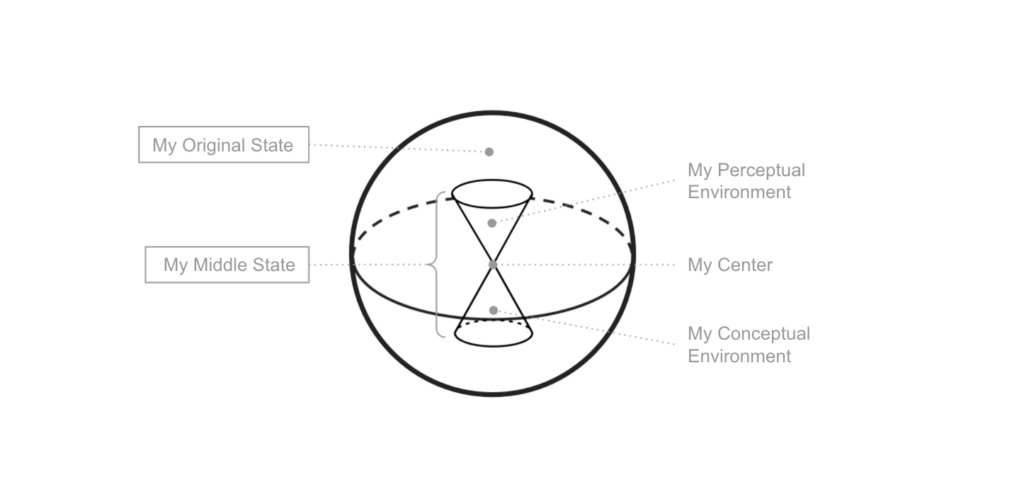Through probing, I discover that this unmoving point behind my eyes at the intersection of my thoughts, feelings, and perceptions is actually a much larger environment enclosing the familiar second place.
I am not a person within a world, but a place within a larger place. I am experiencing the second place within the first place.

I can visualize the entire range of my existence with a simple two-step exercise.
Step 1: I close my eyes and still my thinking. I sense that I am in an endless black ‘space’. This is the first place. Initially, I try to ‘see’ and ‘understand’ this space with my mind. But I must concentrate on the place before my mind and physical body to more deeply experience it.
Step 2: I open my eyes and resume my thinking. I sense that I am in a three-dimensional outer space augmented by a rich mental and emotional inner space. This is the second place. Due to familiarity, it is easy for me to ‘experience’ it physically, mentally, and emotionally.
The space I experience when I close my eyes is actually the container for the space I experience when I open my eyes. The difference between these two ‘places’ is the extent, or depth, of my position within the second place.
With time and effort, I can evolve from observing my original state with the faculties of my middle state to directly experiencing it.
…
Next: I am everywhere
How do I know that my second place exists within my first place, rather than the other way around?
It took me some time and contemplation to be able to visualize the topography of my existence. The first clue came when I realized that there was a fixed point in my head, behind my eyes, that never moved or changed.
Secondly, when I do close my eyes and concentrate on that fixed point, I realize that it is unlimited in ‘size’, extending in all directions without boundaries or divisions of any sort. Further, everything in my physical, mental, and emotional ‘self’ happens within that space.
With some effort, I can detach from my physical, mental, and emotional environments and just experience the space; but I can never escape the space itself.
Is this first place I experience as a dark, infinite ‘space’, God?
Yes. It is the place I do not want to leave when I wake up every day. And it is the place I go when I fall asleep at the end of my day. It is also the place I briefly experience every time I close or blink my eyes. And, when I am aware of it, it is the point I feel behind my eyes, within my head when I am fully awakened in the second place.
This second place is God, consciousness, the observer, the universe, the source. Whatever I want to call it.
This is how I can state, with full conviction, that “I am God”, but further clarify by saying “I am God when I sleep”.
If I am God in the the first place, then what I am I in the second place?
If my first place is “God”, then in keeping with traditional imagery, I can say that I am in a “fallen state” in the second place. I could also say that in sleep, where I am God, I experience heaven. But when I awaken into this constrained and divided body, I am in hell. I might say that I am “Satan” when I awaken.
These characterizations are not required, but they can be useful to make sense of many of the truths hidden in plain sight in the stories I have learned.
What about all the other explanations of existence?
Any explanation that takes as its premise that I am only a temporary observer of a larger shared reality is going to lead to confusion and disempowerment because it is built on something I cannot myself know.
Religious explanations exalt a deity I can only understand through a hierarchy of godly men. I am nothing within that hierarchy.
Secular explanations exalt a deity of knowledge I can only understand through the priesthood of scientific authorities. I am nothing within that hierarchy.
Spiritual explanations exalt various deities of achievement, and have their own hierarchies of commercial gurus. I am nothing within that hierarchy.
Social explanations exalt deities of power, achievement, and status and have rigid hierarchies of commercial and financial priests who exemplify ‘success’. I am nothing within those hierarchies.
All these world-views offer realities where I am detached from the deity, dependent on arcane knowledge, rituals, behaviors, qualities, and practices known to or possessed by a small and empowered minority. In these views, I believe that I am only an insignificant observer, and so that is the state I awaken into every day in the second place.
Descentism de-mystifies the deity, restores my authority over my existence, and provides a clear framework for making decisions that advance my one desire for peace. When I have authority over my existence, I can see the world I awaken into for what it is: a place I do not want to be.
